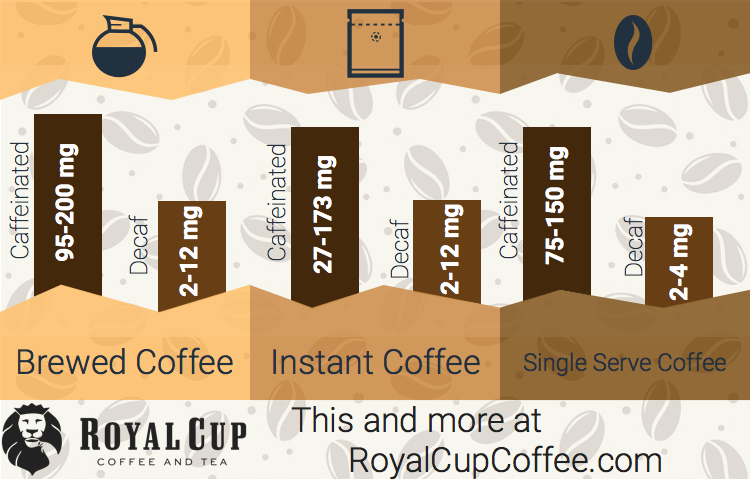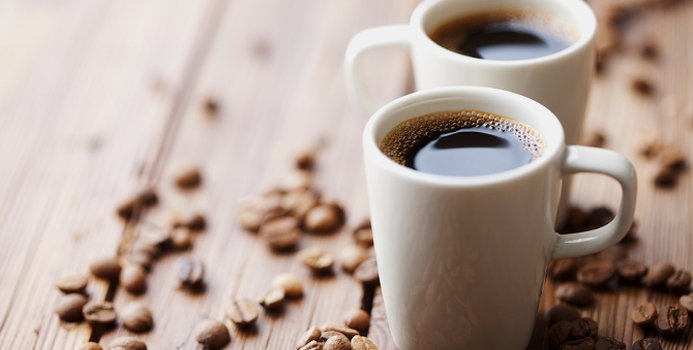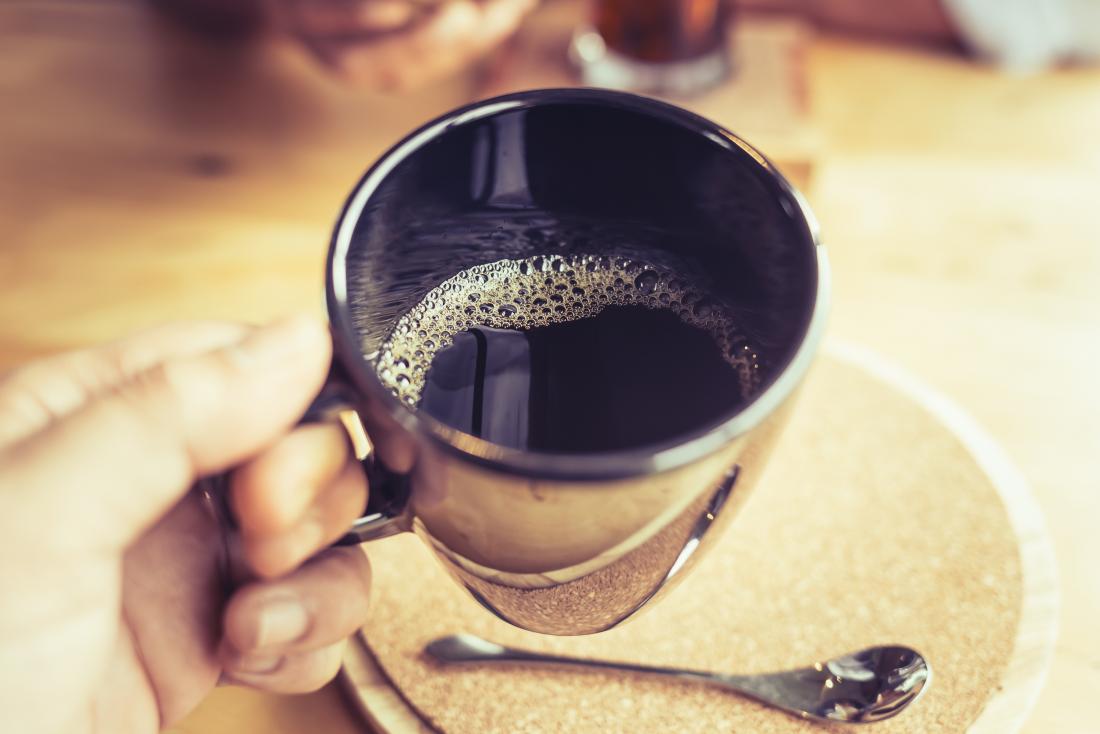What Is Decaf Coffee And How Is It Made?

Decaf coffee, short for decaffeinated coffee, is a type of coffee that has had most of its caffeine content removed. It is made from regular coffee beans through a decaffeination process. Several methods are used to remove the caffeine, including the Swiss Water Process, direct solvent extraction, and CO2 extraction. These methods involve soaking or steaming the beans and extracting the caffeine using water, solvents, or carbon dioxide. The result is a coffee with significantly reduced caffeine content, typically containing only 1-2% of the original caffeine content. Decaf coffee is a popular choice for those who want to enjoy the taste of coffee without experiencing the stimulating effects of caffeine.
What Is Decaf Coffee And Its Caffeine Content
Decaf coffee, short for decaffeinated coffee, is a type of coffee that has had most of its caffeine content removed. It is made from regular coffee beans through decaffeination, which involves soaking or steaming the beans and extracting the caffeine using various methods. Despite popular belief, decaf coffee is not completely caffeine-free. It still contains trace amounts of caffeine, typically 5 to 10 mg per 8 oz. cup. A regular cup of coffee contains around 95 mg of caffeine. Therefore, decaf coffee has significantly less caffeine than regular coffee but is not completely devoid.
Decaffeination Methods And Regulations
Decaffeination methods remove caffeine from coffee beans, resulting in decaf coffee. Manufacturers use several methods to achieve this. The most common methods include the Swiss Water Process, solvent-based processes using either methylene chloride or ethyl acetate, and the carbon dioxide (CO2) method.
Each method has its benefits and drawbacks, and the choice of method may vary depending on cost, environmental concerns, and taste preservation. Regardless of the method used, decaffeinated coffee must adhere to industry regulations. Industry standards require that at least 97% of caffeine be removed from coffee beans in order for it to be labeled as “decaffeinated.” This ensures that decaf coffee still contains significantly less caffeine than regular coffee, making it a suitable choice for those looking to reduce their caffeine intake.
The Amount Of Caffeine In Decaf Coffee

Decaf coffee is known for having significantly less caffeine than regular coffee but is not completely caffeine-free. The amount of caffeine in decaf coffee can vary depending on the original content and the decaffeination process used. According to industry standards, at least 97% of caffeine must be removed from the coffee beans to be considered decaffeinated. This means there can still be trace amounts of caffeine, typically around 7mg per 8-ounce cup. It’s important to remember this if you are sensitive to caffeine or trying to reduce your overall intake.
Caffeine Levels In Decaf Coffee Compared To Regular Coffee
When comparing caffeine levels, it’s important to note that decaf coffee contains significantly less caffeine than regular coffee. While a standard cup of regular coffee contains around 100 mg of caffeine, the decaffeinated version only has 2-3 mg per cup. This means that decaf coffee has less than 1% of the caffeine in regular coffee. So, if you want to reduce your caffeine intake or avoid its stimulating effects, decaf coffee can be a suitable alternative without sacrificing your love for coffee.
Factors Affecting Caffeine Content In Decaf Coffee
Several factors can influence the caffeine content in decaf coffee. One of the main factors is the type of coffee bean used. Arabica beans, known for their higher caffeine content, typically have more residual caffeine after decaffeination than Robusta beans.
The decaffeination method used also plays a role. Different methods, such as the Swiss Water Process or solvents like methylene chloride or ethyl acetate, can affect the coffee’s caffeine amount.
Furthermore, the degree of roasting can impact caffeine levels. Lighter roasts tend to retain more caffeine compared to darker roasts.
Overall, it’s important to remember that while decaf coffee does contain significantly less caffeine than regular coffee, there can still be minor variations in caffeine content depending on these factors.
Myth: Decaf Coffee Is Completely Caffeine-free

Many believe decaf coffee is completely caffeine-free, but this is not entirely true. While decaffeination removes about 97% of the caffeine, a small percentage remains. By law, decaf coffee must be at least 97% caffeine-free but not completely devoid of caffeine. The exact amount of caffeine can vary depending on factors such as the type of coffee bean used and the decaffeination method employed. So, while decaf coffee has significantly less caffeine compared to regular coffee, it is not completely caffeine-free.
Debunking The Myth Of Decaf Coffee Being Caffeine-free
Many believe decaf coffee is completely caffeine-free, but this is not entirely true. While decaffeination removes about 97% of the caffeine, a small percentage remains. By law, decaf coffee must be a minimum of 97% caffeine-free. However, the amount of caffeine can vary depending on factors such as the coffee bean used and the decaffeination method employed. So, while decaf coffee has significantly less caffeine compared to regular coffee, it is not completely caffeine-free. It is important to be aware of this when consuming decaf coffee.
Understanding Trace Amounts Of Caffeine In Decaf Coffee
Trace amounts of caffeine can still be found in decaf coffee despite the removal process. While decaffeination is designed to eliminate as much caffeine as possible, it is virtually impossible to remove 100% of it. The remaining caffeine exists in small, trace amounts. The exact quantity can vary depending on factors such as the type of coffee bean and the decaffeination method used. It’s important to note that these trace amounts of caffeine are significantly lower than regular coffee. However, individuals who are highly sensitive to caffeine should still be cautious when consuming decaf coffee.
Health Effects Of Decaf Coffee Consumption

Decaf coffee consumption can have both positive and negative health effects. On the positive side, decaf coffee has been linked to a reduced risk of certain diseases, such as type 2 diabetes and liver disease. It contains antioxidants that can help protect the body against cell damage. Additionally, decaf coffee has been shown to have a lower impact on blood pressure and heart rate than regular coffee, making it a safer choice for individuals with cardiovascular issues. However, it’s important to note that decaf coffee has drawbacks, such as its potential to increase cholesterol levels. As with any food or drink, moderation is key to enjoying the health benefits of decaf coffee while minimizing any potential negative effects.
Health Benefits And Drawbacks Of Consuming Decaf Coffee
Decaf coffee consumption can have both positive and negative health effects. On the positive side, decaf coffee has been linked to a reduced risk of certain diseases, such as type 2 diabetes and liver disease. It contains antioxidants that can help protect the body against cell damage. Additionally, decaf coffee has been shown to have a lower impact on blood pressure and heart rate than regular coffee, making it a safer choice for individuals with cardiovascular issues. However, it’s important to note that decaf coffee has drawbacks, such as its potential to increase cholesterol levels. As with any food or drink, moderation is key to enjoying the health benefits of decaf coffee while minimizing any potential negative effects.
Comparison Of Caffeine-related Health Effects Between Regular And Decaf Coffee
Regarding the health effects of caffeine, it’s important to note the differences between regular and decaf coffee. Regular coffee contains varying amounts of caffeine, which can positively and negatively affect the body. Caffeine has been shown to increase energy levels, enhance alertness, and improve cognitive function. However, excessive consumption of caffeine can lead to issues such as insomnia, anxiety, and digestive problems. On the other hand, decaf coffee provides a milder caffeine content, reducing the likelihood of these side effects. It’s a great alternative for individuals sensitive to caffeine or considering limiting their caffeine intake.
Decaf Coffee Vs. Regular Coffee: Taste And Aroma

Differences in taste and aroma between decaf and regular coffee can be subtle, but various factors can also influence them. Decaf coffee is often described as slightly milder and with a less bold flavor than regular coffee. The aroma of decaf coffee may also be less intense. However, with advancements in decaf coffee production, many specialists focus on preserving the rich flavors and aromas that coffee lovers enjoy. This means that there are now high-quality decaf coffee options that can provide a satisfying and flavorful experience for those who want to limit their caffeine intake.
Differences In Taste And Aroma Between Decaf And Regular Coffee
Decaf coffee and regular coffee have some subtle differences in taste and aroma. Decaf coffee is often described as slightly milder and with a less bold flavor than regular coffee. It may not have the same intensity or complexity as the full caffeine version. The aroma of decaf coffee can also be less intense than regular coffee. However, with advancements in decaf coffee production, many specialists focus on preserving the rich flavors and aromas that coffee lovers enjoy. This means that there are now high-quality decaf coffee options that can provide a satisfying and flavorful experience for those who want to limit their caffeine intake.
Factors Influencing Flavor Profile In Decaf Coffee
Several factors can influence the flavor profile of decaf coffee. Firstly, the origin and quality of the beans play a significant role. Premium Arabica beans are often preferred for decaf coffee due to their naturally complex and nuanced flavors. The decaffeination process itself can also impact the taste. Different methods, such as the Swiss Water Process or the CO2 method, may preserve more of the coffee’s natural flavors. Lastly, the roast level can affect the flavor, with lighter roasts allowing the natural nuances of the beans to shine through, while darker roasts can impart bolder, caramelized flavors. Ultimately, these factors contribute to the overall taste experience of decaf coffee.
Conclusion
In conclusion, it is important to debunk the myth that decaf coffee is completely caffeine-free. Decaf coffee does contain trace amounts of caffeine, although significantly less than regular coffee. The decaffeination process removes most of the caffeine, but it is still required by law to be a minimum of 97% caffeine-free. Factors such as the origin and quality of the beans, the decaffeination method used, and the roast level can all influence the flavor profile of decaf coffee. Understanding decaf coffee’s caffeine content and its impact on health can help coffee lovers make informed choices.
Summary Of Key Points Debunking Myths About Decaf Coffee And Its Caffeine Content
Decaf coffee is not completely caffeine-free; it still contains trace amounts of caffeine, although significantly less than regular coffee. The decaffeination process removes most of the caffeine, but decaf coffee must be at least 97% caffeine-free by law. Contrary to popular belief, decaf coffee is not weaker in flavor or aroma than regular coffee. Factors such as the origin and quality of the beans, decaffeination method, and roast level can all influence the taste of decaf coffee. It is important to understand these facts to make informed choices about decaf coffee consumption.
Clarification On The Caffeine Content In Decaf Coffee And Its Impact On Health
Despite being labeled “decaffeinated,” decaf coffee still contains trace amounts of caffeine. While the caffeine content in decaf coffee is significantly lower than regular coffee, it is important to note that it is not completely caffeine-free. The small amount of caffeine in decaf coffee is generally insufficient to cause significant health effects for most individuals. However, for those who are extremely sensitive to caffeine or have certain health conditions, even this small amount may need to be avoided. It is recommended to consult with a healthcare professional for personalized advice regarding caffeine consumption.
FAQ About Decaf Coffee And Caffeine
Q: Does decaf coffee have caffeine?
A: Decaf coffee contains a small amount of caffeine, although significantly less than regular coffee.
Q: How much caffeine is in decaf coffee compared to regular coffee?
A: Decaf coffee typically contains about 2 to 5 milligrams of caffeine per 8-ounce cup, whereas regular coffee can have anywhere from 70 to 140 milligrams per cup.
Q: How is caffeine removed from decaf coffee?
A: Several methods are available to remove caffeine from coffee, including the Swiss Water Process, carbon dioxide method, and solvent-based method.
Q: Is decaf coffee completely caffeine-free?
A: No, decaf coffee is not completely caffeine-free, but it has significantly lower caffeine content than regular coffee.
Q: Can decaf coffee still cause jitters or insomnia?
A: While decaf coffee has less caffeine, it may still cause sensitivity in some individuals. If you are sensitive to caffeine, it’s best to monitor your intake of decaf coffee.
Q: Does decaf coffee taste different from regular coffee?
A: Yes, decaf coffee can have a slightly different taste than regular coffee due to the caffeine extraction process, but many people find the taste very similar.

Deb Carlson at Crosslake Coffee: Join Deb at Crosslake Coffee for a delightful blend of community, caffeine, and creativity. Discover the cozy ambiance and warm hospitality that make this local coffee shop a beloved gathering spot. From expertly crafted espresso drinks to mouthwatering pastries, Deb invites you to savor every sip and bite. Stay connected with the latest updates on specials, events, and live music performances by following Deb Carlson at Crosslake Coffee on social media. Embrace the vibrant online community and share your love for great coffee and good company with fellow enthusiasts. Don’t miss out on a moment of the Crosslake Coffee experience – connect with Deb on social media today.
